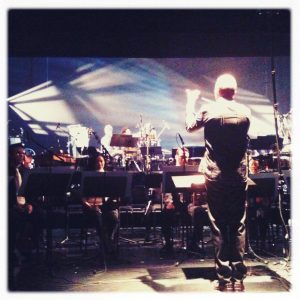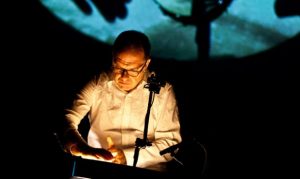 Holland Festival
Holland Festival
From the mild, everyday cacophony around the Muziekgebouw in the afternoon, on the terrace by the IJ, you'll get into the silence of the concert hall in a few steps. For three and a half hours (with over two hours of breaks in between), Asko|Schönberg, Slagwerk Den Haag and Capella Amsterdam will play and sing your ears off. Steven Schick (a.o. once Bang on a Can), not only conducts, but also takes charge of the middle part of the concert, at the Bimhuis, as a percussionist. Under his inspired direction, 'Nine Rivers' navigates between spectacle and purism: a battle between complex form and the simplicity of raw sound matter.

In defiance of the average music programming, which squeezes the contemporary composer into a framework of roughly 20 minutes per piece, Dillon always released separate movements between 1982 and 2000. Only in 2010 was the cycle 'Nine Rivers' performed in its entirety for the first time, in Glasgow, in honour of the Scotsman's 60th birthday. And now so is the magnus opus at the Holland Festival.
Dillon is self-taught, as it is called in the still very academically oriented world of composed music. He studied among others. electronic music, acoustics and linguistics, but very important seems to be the influence of Indian classical music. 'Nine Rivers' is a long-breath, grandly extended piece for rhythm instruments and feedback. The strings and horns also have to contend with it.
From the beautiful swing of the noisy opening on metal, through more delicate and enigmatic murmurs, Dillon slowly works towards an ever-expanding palette of individual voices. Accents and counter-accents vie, but nothing ever emerges for good. Strings seem entangled in a conversational drama as the region and counter region of individual violinists are played off against each other. A concerto for alto flute blends in. Drums and vibraphone enter into a resonant dialogue with muted horns. The 16-piece Cappella Amsterdam lisp and shout, but never as if from 1 throat. Everything seems aimed at creating a great pool of resonance, parlando piled on parlando, layer upon layer.
The famous ''Bateau Ivre' (drunken boat) by Arthur Rimbaud, but also the time-honoured Panta Rhei (everything is in motion) by Herakleitos were starting points. Time as the experience of a relentless stream, of interruption and resumption, of discharge and exit - Nine Rivers constantly steps outside its own banks, with individual voices sounding unusually clear, but also constantly threatening to be swallowed up by the extraordinarily beautifully constructed, ever-repeating bed of sound. The orchestrated multiplicity resembles a piece of Ganges. The foam of the earth washes on and over.
Yet the piece as a whole also has something quite surveyable, for those who surrender. Gongs and drums provide orienting signals, and also the regular return to zero points in the form of a real silence allows for a renewed dive into the river. Whereas during the first four movements, the various parts (percussion, strings, winds and singers) are introduced as in a continuous, forward stumbling, downstream passage, the last four movements resemble wading through low water. Much slower movements, which have something fruitless about them, reminiscent of barren riverbeds or desiccation on salty sea, including flaring visions and fatamorgas. Besides fairytale-like motifs and unsettling feedback, Ross Karre's video work for the middle section is also to blame.

Subtle centrepiece of the whole concert is the intriguing solo for Steven Schick, who initially traverses the dark stage somewhat uncomfortably between the various percussion set-ups. His footsteps on the wooden floor of the Bimhuis stage cannot be heard apart from all the other sound already produced. With part 5: La Coupure, images and text are now introduced. "A sensation passing through the body, from the crouch all the way to the ears." Children's voices and peepholes, building plans and a dry riverbed introduce Schick's rise. Against the grand scoring of the other eight movements, this intimate movement seems intended to be the key of the cycle. All the principles are introduced manually. With a stick on a cube or pan. With forms of amplification and feedback that blow the soloist off the stage and leave the audience in confusion. Where should I listen? What is my role?
Slowly, the virtuoso Schick surrenders. The simplicity of the means and the refinement with which those means are transformed into musical feeling is moving. The whole cycle 'Nine Rivers' thus takes on something of a grand ritual, to very slowly transform the incantation with complexity and virtuosity into an experience of complexity, allowing polyphony and incongruity in a world full of confusion about what is original, original or pure and what is fake, kitch or outdated, 'bin there - done that'. For the Ganges is one and the same, everything eventually washes up as rubbish. And anyone can dip into the river again and again. Not individual mastery and brilliant propositions, but the sense of proportions and proportions seem important, as does the drunken pleasure of playing together, though 'Nine Rivers' is by no means child's play.
Nine Rivers: 5. La coupure (1989-2000):
